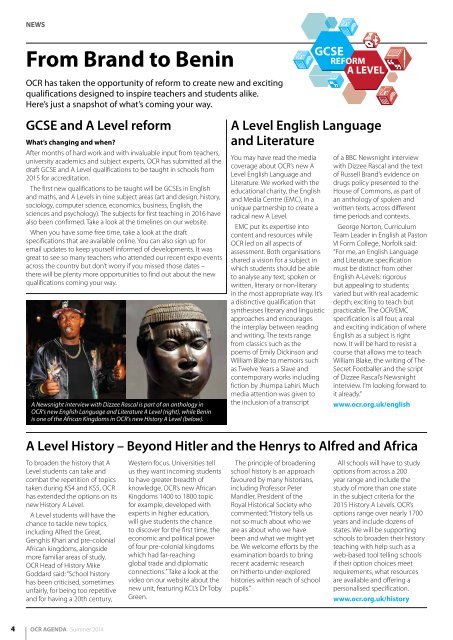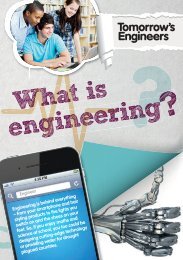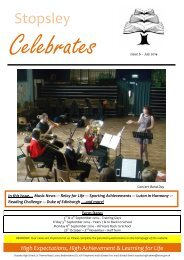177447-agenda-summer-2014
177447-agenda-summer-2014
177447-agenda-summer-2014
- No tags were found...
You also want an ePaper? Increase the reach of your titles
YUMPU automatically turns print PDFs into web optimized ePapers that Google loves.
NEWSFrom Brand to BeninOCR has taken the opportunity of reform to create new and excitingqualifications designed to inspire teachers and students alike.Here’s just a snapshot of what’s coming your way.GCSE and A Level reformWhat’s changing and when?After months of hard work and with invaluable input from teachers,university academics and subject experts, OCR has submitted all thedraft GCSE and A Level qualifications to be taught in schools from2015 for accreditation.The first new qualifications to be taught will be GCSEs in Englishand maths, and A Levels in nine subject areas (art and design, history,sociology, computer science, economics, business, English, thesciences and psychology). The subjects for first teaching in 2016 havealso been confirmed. Take a look at the timelines on our website.When you have some free time, take a look at the draftspecifications that are available online. You can also sign up foremail updates to keep yourself informed of developments. It wasgreat to see so many teachers who attended our recent expo eventsacross the country but don’t worry if you missed those dates –there will be plenty more opportunities to find out about the newqualifications coming your way.A Newsnight interview with Dizzee Rascal is part of an anthology inOCR’s new English Language and Literature A Level (right), while Beninis one of the African Kingdoms in OCR’s new History A Level (below).A Level English Languageand LiteratureYou may have read the mediacoverage about OCR’s new ALevel English Language andLiterature. We worked with theeducational charity, the Englishand Media Centre (EMC), in aunique partnership to create aradical new A Level.EMC put its expertise intocontent and resources whileOCR led on all aspects ofassessment. Both organisationsshared a vision for a subject inwhich students should be ableto analyse any text, spoken orwritten, literary or non-literaryin the most appropriate way. It’sa distinctive qualification thatsynthesises literary and linguisticapproaches and encouragesthe interplay between readingand writing. The texts rangefrom classics such as thepoems of Emily Dickinson andWilliam Blake to memoirs suchas Twelve Years a Slave andcontemporary works includingfiction by Jhumpa Lahiri. Muchmedia attention was given tothe inclusion of a transcriptof a BBC Newsnight interviewwith Dizzee Rascal and the textof Russell Brand’s evidence ondrugs policy presented to theHouse of Commons, as part ofan anthology of spoken andwritten texts, across differenttime periods and contexts.George Norton, CurriculumTeam Leader in English at PastonVI Form College, Norfolk said:“For me, an English Languageand Literature specificationmust be distinct from otherEnglish A-Levels: rigorousbut appealing to students;varied but with real academicdepth; exciting to teach butpracticable. The OCR/EMCspecification is all four, a realand exciting indication of whereEnglish as a subject is rightnow. It will be hard to resist acourse that allows me to teachWilliam Blake, the writing of TheSecret Footballer and the scriptof Dizzee Rascal’s Newsnightinterview. I’m looking forward toit already.”www.ocr.org.uk/englishA Level History – Beyond Hitler and the Henrys to Alfred and AfricaTo broaden the history that ALevel students can take andcombat the repetition of topicstaken during KS4 and KS5, OCRhas extended the options on itsnew History A Level.A Level students will have thechance to tackle new topics,including Alfred the Great,Genghis Khan and pre-colonialAfrican kingdoms, alongsidemore familiar areas of study.OCR Head of History MikeGoddard said: “School historyhas been criticised, sometimesunfairly, for being too repetitiveand for having a 20th century,Western focus. Universities tellus they want incoming studentsto have greater breadth ofknowledge. OCR’s new AfricanKingdoms 1400 to 1800 topicfor example, developed withexperts in higher education,will give students the chanceto discover for the first time, theeconomic and political powerof four pre-colonial kingdomswhich had far-reachingglobal trade and diplomaticconnections.” Take a look at thevideo on our website about thenew unit, featuring KCL’s Dr TobyGreen.The principle of broadeningschool history is an approachfavoured by many historians,including Professor PeterMandler, President of theRoyal Historical Society whocommented: “History tells usnot so much about who weare as about who we havebeen and what we might yetbe. We welcome efforts by theexamination boards to bringrecent academic researchon hitherto under-exploredhistories within reach of schoolpupils.”All schools will have to studyoptions from across a 200year range and include thestudy of more than one statein the subject criteria for the2015 History A Levels. OCR’soptions range over nearly 1700years and include dozens ofstates. We will be supportingschools to broaden their historyteaching with help such as aweb-based tool telling schoolsif their option choices meetrequirements, what resourcesare available and offering apersonalised specification.www.ocr.org.uk/history4 OCR AGENDA Summer <strong>2014</strong>




